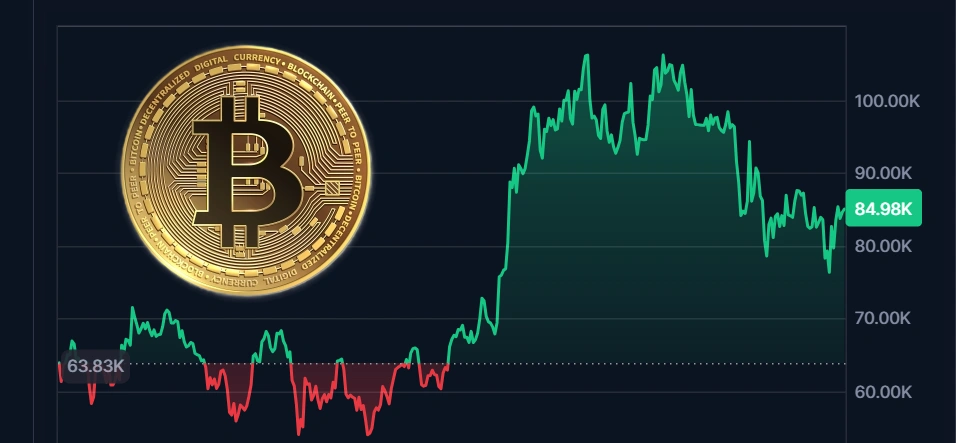The Anatomy of the Supply Gap
The supply gap traces back to November 2024, when Bitcoin surged 10.7% in just 72 hours from $70,000 to $80,000, fueled by President Trump’s crypto-friendly election win. This rapid ascent left scant trading activity in its wake, creating a “liquidity desert” between these levels. With little historical buying to anchor prices, a retreat below $80,000 could see BTC plummet toward $73,000—or lower—before finding solid footing.
Key Data Points
Sparse Holdings: Only 100,000 BTC, less than 0.5% of the circulating supply, last transacted between $70K and $80K, compared to over 500,000 BTC in nearby ranges (Glassnode).
Underwater Investors: Roughly 20% of Bitcoin’s 19.6 million circulating coins (3.7 million BTC) are held at a loss as of April 2025, per CoinDesk.
Sell-Off Pressure: Short-term holders dumped 100,000 BTC since January’s peak, amplifying volatility risks.
Why $80K Is the Line in the Sand
If Bitcoin slips below $80,000, BitEdge foresees a cascade of selling. The 20% of holders currently underwater might panic, while the lack of buyers in the $70K to $80K zone could accelerate a drop to $73,000, the prior high from March 2024. Worse still, a faltering institutional appetite could push prices toward $60,000. Spot Bitcoin ETFs, managing 8% of BTC supply, saw inflows drop to $120 million daily in Q1 2025 from $450 million in late 2024, per SosoValue.

Market Forces: Miners, Macros, and Sentiment
Miners feel the squeeze after the April 2024 halving, which slashed rewards to 3.125 BTC per block. Rising U.S. energy costs, up 15% since 2024, per the Energy Information Administration (EIA) data, have forced sales of 100,000 BTC in early 2025. Meanwhile, Trump’s January 2025 tariff proposals have reignited inflation fears, dimming hopes of rate cuts and cooling risk assets like BTC. The Fear & Greed Index, at 38 (“Fear”) as of March 30, reflects this unease.
Yet, bulls cling to hope. Bitcoin’s daily issuance is now just 450 BTC – down 82% since 2020 – bolstering its scarcity appeal.
Historical Echoes and Future Scenarios
Past supply gaps offer clues. In 2021, a $30K-$40K void preceded a 54% crash; in 2023, a $16K-$19K accumulation zone sparked a rally to $48,000.
Predictions vary for 2025: Blockzeit sees a $200,000 peak if adoption surges, while JPMorgan warns of a $72,000 floor if macro pressures mount.
As for BitEdge, our base case of $110,000 hinges on steady ETF demand, a fragile bet given current trends.
Investor Playbook: Navigating the Storm
Short-term traders should watch $79,500 as a stop-loss trigger, with $86,000 as a bullish breakout signal tied to CME futures gaps. Long-term holders might buy dips below $75,000 or hedge via mining stocks like Marathon Digital (+22% YTD).
A collapse could drag altcoins down 7% into deeper losses. Conversely, a breakout might validate BlackRock’s Larry Fink’s $700,000 call if sovereign funds dive in.
With central banks indirectly legitimizing blockchain via CBDCs, Bitcoin’s long game remains intact, supply gap or not.
Parting Shot: Stakes Balancing Act
Bitcoin’s $70K–80K supply gap is a powder keg beneath its $83,000 perch. Miners, macros, and market psychology will decide if it’s a trapdoor to $60,000 or a springboard.
The only certainties with cryptocurrency are surprises!
He has worked with several companies in the past including Economy Watch, and Milkroad. Finds writing for BitEdge highly satisfying as he gets an opportunity to share his knowledge with a broad community of gamblers.
Nationality
Kenyan
Lives In
Cape Town
University
Kenyatta University and USIU
Degree
Economics, Finance and Journalism


Facts Checked by Will Wood



 Fact checked by
Fact checked by 
 eabungana@gmail.com
eabungana@gmail.com 